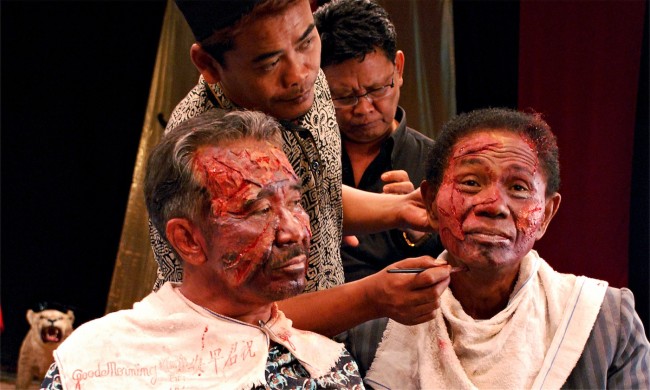The Act of Killing
dir. by Joshua Oppenheimer
Like the subjects of Joshua Oppenheimer’s surreal documentary The Act of Killing, Josef Stalin knows a thing or two—or 20 million—about murder. “The death of one man is a tragedy, the death of millions is a statistic.” How aptly put, Mr. Stalin. How can anyone comprehend millions of deaths when we barely understand one? Tragedy is a big word. Now multiply it by millions and the word grows far too abstract to handle. It’s easier to do so with the application of numbers. It’s the personal at war with the cerebral. A war, more or less, that Oppenheimer wages valiantly, but on the side of the cerebral.
The stories told here are horrifying, especially coming from such a tiny framed man as Antwar. He smiles, he dances, he sings drunkenly at the bar. Stories of death spill from Antwar’s lips like babbling reminiscences. Slips of nostalgia. The gravitas of the stories never quite match-up with his diminutive stature. Hobbled by old age, stringy and grayed, made dull by the drugs and alcohol he consumes all day to help cope with the nightmares he confronts whenever asleep—or so he claims—Antwar is a shadow of his former self, no longer threatening. Whatever intimidation he might have imposed before has faded with age. The brutality of Antwar’s past doesn’t come alive until he finally demonstrates, in full detail, how he used to execute Indonesian “communists” back in ’65. It’s efficient. It’s clean. It’s a means to a statistical end. Fixed between a pole and someone’s grip, usually Antwar’s, Antwar would loop a length of wire around his victim’s neck and pull until they went limp. He killed a thousand people this way.
Antwar and a slew of other men were partly responsible for the death of 500,000 Indonesian “communists”—a term used liberally to describe anyone who spoke against the grain—during the political purge of 1965-66. They were considered glorified “gangsters”—a term they appropriated from the dozens of American films they watched as black-market ticket scalpers a year or so before being inducted into the death squad fold. Critics who argue that movies don’t inspire violence in others won’t find any love here. These guys were highly susceptible to the slick stylization of cinematic violence—to the point where they ask themselves: How about we shoot a movie of our own?
After all, history’s written by its victors.
Joining Antwar in his cinematic endeavor is another former death squad leader, a flamboyant, roly-poly cohort, Herman, who acts as producer to Antwar’s auteur. We first see him strolling through the city slums with Antwar and co. in search of extras willing to play “communist” denizens in their film. There are few takers, all reticent with fear. They know who these guys are. They know what they’ve done. Herman promises the people that nothing will happen to them. All they want is to shoot their movie. Herman galvanizes the crowd, directs their misery, and inhabits the role of the “gangster” hero and plays it with the bravura of a propagandist legend, shouting, threatening: “Burn their houses down! Burn the communists!” And the kids flail and shout and cry for their homes. You can see the tears and snot welled up, hiccups in their breath. They don’t know any better. They’ve heard the stories: these are the bogeymen of their worst nightmares come to life.
What’s most unnerving about Oppenheimer’s film is how quickly you come to know these men, and just how silly their lives prove to be. Stripped of their menace, all that’s left is the deflated ego—a cartoon. It’s difficult to take these men seriously. In their own way, they’ve become parodies of themselves, irrelevant. Like the classic American genres they come to ape for their film—the western, the neo-noir, the musical, which they swear will reveal the truths of their “gangster” patriotism—they are mythological grandeur debunked. We watch, disillusioned, as they fall trap to their own illusions. The magic, the terror: it’s gone. We’ve peeked behind the curtain, watched the making-of; we know there’s nothing more to these monsters than rotting flesh. They age like anyone else. They’re pathetic like everyone else. And Oppenheimer is quick to catch them in their irony. Sitting before a mirror while the crew applies scarred and lacerated makeup to their faces—the wounds of heinous mistreatment—Antwar and a fellow death squad leader, Adi, a realist of the heaviest kind, talk about their illusions. Antwar still struggles with his, choosing to believe in the rationales he’s pumped his head full of, like an all-concealing fog, while Adi, simply, bluntly, tells Antwar he’s wrong. What they did is heinous, but they did it because there was power to be had. They didn’t do it to preserve a nation’s political purity; they did it because it offered them status and a means to make money, and lots of it. Adi’s fully aware of this. But Adi doesn’t care, because it’s he who gets to write history. He’s the one on top; he’s the victor. Adi refuses to dwell. He won’t have anyone tell him what he did was wrong or inhumane. That means nothing to him. He still has a family, still has a phone-obsessed teenage daughter he takes to the mall for shopping sprees. The past doesn’t linger with him as it does for Antwar. Or maybe, like everyone else, he hasn’t been able to assign the stats any higher meaning, knows that there isn’t any larger meaning, and keeps himself from wrestling with it. He knows the limits of abstract thought. He knows its usefulness ends after a certain number of deaths. And by that count, he’s the most rational in a film dominated by the irrational.
It’s all so casual: the way they speak of these murders, the way Herman sits around the set dressed in drag between takes, the way a parliament official so flippantly asks his caddy about her pussy. It’s so casual it’s surreal. And it’s so surreal that you can’t help but be hypnotized by the film rather than horrified. There’s something lost in the film’s intellectual, tongue-in-cheek approach. The horror doesn’t resonate as deeply as it should. The film’s too cerebral for that.
Even the film’s title is too clever for its own good. The Act of Killing. The act as in the actual action of killing, as well as the act—the performance—the role Antwar and co. must play to recreate the past. It’s no surprise that Errol Morris loved the movie enough to stamp his name all over it. Morris hates the idea of labeling his films “documentaries.” He prefers “nonfiction” films. Morris argues that there is no such thing as reality. It’s all perception, which is warped and prefigured by context and content. Sure, there are facts, and statistics, like the genocide of 500,000 Indonesians, but the interpretation of those numbers, the stories derived from such stats, the angles, the tone, are entirely up to the artist or the people perceiving them. The lines blur. In the neo-noir portion of the film, Antwar jumps in the role of a captured “communist” strapped to a chair, awaiting his death. Herman plays the “gangster” bullying Antwar for information. Antwar refuses to budge. That’s no good. That means his life. Herman snaps his fingers, calls for the wire, and loops it around Antwar’s neck for the fatal tug. The men follow suit and ACT! and pull and grit their teeth, snuffing the “life” out of Antwar’s “communist” villain. Antwar has to call for a cut. The scene’s too intense for him. Flopped in sweat, gasping for air, he admits to Oppenheimer and anyone else willing to listen:
Antwar:
I can feel what the people I tortured felt. Because here my dignity has been destroyed, and then fear come, right there and then. All the terror suddenly possessed my body. It surrounded, and possessed me.
Oppenheimer:
Actually, the people you tortured felt far worse, because you knew it’s only a film. They knew they were being killed.
Antwar:
But I can feel it , Josh. Really, I feel it. Or have I sinned. I did this to so many people, Josh. Is it all coming back to me? I really hope it won’t.
Before movie’s end, Antwar revisits the rooftop where he first demonstrated to Oppenheimer and his crew his wire technique. He walks along the roof remembering the deaths, fingering the wire, no longer feeling the impulse to tap dance, when he suddenly retches, dry, like a dog. The sound is guttural and deep. His stomach churns with thoughts of past sins. Has it all finally caught up with him? Is this disgust? Is this self-loathing he’s gagging on? Will he finally, physically, show us his remorse? You can’t help but stare at Antwar, transfixed, watching his back shutter under the convulsions, waiting, patiently, yearning for him to vomit, to spill his guts—the final proof needed to answer what this man’s all about, if the guilt’s truly there poisoning his gut. You want to see him purge his crimes, not for catharsis, but for evidence. You want to know that the rest of this man’s life will be spent in Dostoevsky-like torment. But the vomit never comes. Just the shutters, the gag. The exterior remorse, without the interior. It’s a performance. It’s there for the camera’s sake. Antwar’s put one over us.
Or maybe he hasn’t. Maybe the illusion’s so thick, the line between the real and unreal so hazy, that Antwar is just as confused as us—lost in the illusion. Lost in the numbers.






